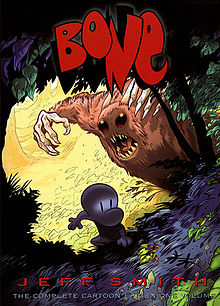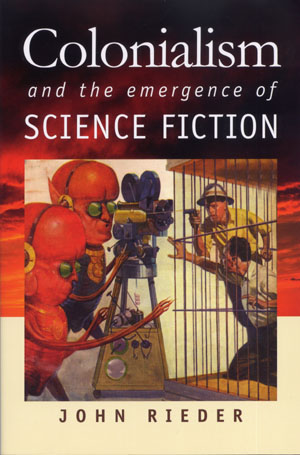I’ve been reading Jason Mittel’s book “Genre and Television” over Christmas break. In many ways, his take on genre is similar to John Rieder’s. That is, Mittell argues, like Rieder, that genres are constituted not by formal traits, but rather by social or cultural agreements or discourses. So (for example) it might make sense to call something a “comic” even if it were entirely text with no pictures, if the text was written by Dave Sim and came in a floppy format and was sold through a comics store and was part of an ongoing series that people thought of as a comic. Along those lines, a while back I defined comics as those things which are accepted as comics.
I still stand by that definition…but Mittell puts some interesting twists on it. Specifically, when I talk about what things are accepted as comics, I tend to think of the accepting as being done by folks in the comics world, who care about comics. That is, comics is defined by what comics folks (whoever they may be) think of as comics. That can be scholars, fans, readers, or whatever. But to participate in the process of definition, I was assuming, you need to want to be participating in the process of definition. People who don’t care about comics don’t care about comics — someone who has never read or seen a comic is not the person you want to go to for a definition.
Mittell isn’t so sure. For him, television genres are constructed socially, by everyone — even, and sometimes especially, by people who are not fans, or scholars, or even by people who have never watched or thought about the genre in question. Instead, genres are often shaped, or defined, by institutional forces or regulators…or even just by people who have heard something about a show and formed uninformed opinions about it. Thus, early television quiz shows were strongly shaped by federal regulations against lotteries. Even though the Supreme Court eventually determined that game show giveaways were not in fact lotteries, the federal scrutiny of the shows had a strong effect on which shows were made and how, and on public perceptions of the genre, which long had a whiff of scandal and illegitimacy associated with it — perhaps handed down to its progeny, the reality show. (The parallel here with the comics code is fairly obvious.)
As another example, Mittell argues that the genre of talk shows, and especially of daytime talk shows, was importantly shaped and understood through the opinions and ideas of people who did not watch those shows. That is, discussion of the genre — which is in many ways the genre itself — was based on an image of those shows as lowbrow, white trash fare for morons. That’s the vision of those shows that largely circulated as a genre marker in public perception.
Comics, then, is neither constituted by formal elements nor by fan or expert practices or discourses. Rather, it is constituted at least in part by those who do not necessarily read comics at all. And if that’s true, it’s possible that comics are, in fact, in many ways a genre — rather than a medium, which is what most fans and scholars and people who care about comics prefer to think of them as.
Certainly, in the world outside comics-centric blogs, I think there’s little doubt that comics tend to be treated as a genre. For instance, at Netgalley, where book critics can see previews of forthcoming books, comics is one option among many genres, listed as a search option alongside “mystery” or “nonfiction” or “science-fiction”, or what have you. On Amazon, too, there is no separate category for comics; they’re simply subsumed in books, rather than being broken out into their own larger block like movies or music.
Of course, the distinctions between genre and medium is fairly arbitrary anyway. There’s no real formal or ideological reason to think of television as its own medium, for example — it could just as easily be thought of as a genre of film, or both film and television could be thought of as subgenres of “screens,” or even of theater.
Still, the cultural subdivisions are what they are, and the fact is that film, and theater, and even television, are all much more firmly established — institutionally and culturally — as mediums than comics are — a fact which becomes especially clear if you start looking at places and people who maybe don’t care about comics that much to begin with.
So what does it matter if comics are a genre rather than a medium? To some degree, it probably doesn’t matter at all; a comic by any other name will smell as sweet, or as putrid, as the case may be. But, on the other hand, it seems like seeing comics as genre could in some cases shift the context in which comics are discussed, or point towards different questions.
For instance, Mittell talks about the Simpsons as a genre mash-up, in which the genre suppositions of sit-coms, and the genre suppositions of cartoons, are used to undermine or question each other. The formal potential and expectations of cartoons made it possible to create a sit-com with more characters and more venues; the genre expectations of sit-coms made it possible to see a cartoon as aimed at adults (and programmed outside of Saturday morning.)
 Many comics could be talked about along similar lines. For example, Maus might be seen as a mash-up of memoir and comics, using tropes of each to create a crossover audience that appeals to a greater number of people than either memoir or comic might have been able to attain on its own. Bone could be seen as mixing comics genre and fantasy genre in a similar way — and/or to tweak the conventions of both. And/or, a television show like Heroes might be seen as combining comics genres with serial evening soap opera.
Many comics could be talked about along similar lines. For example, Maus might be seen as a mash-up of memoir and comics, using tropes of each to create a crossover audience that appeals to a greater number of people than either memoir or comic might have been able to attain on its own. Bone could be seen as mixing comics genre and fantasy genre in a similar way — and/or to tweak the conventions of both. And/or, a television show like Heroes might be seen as combining comics genres with serial evening soap opera.
None of these ideas are necessarily innovative or undiscussed or anything. But I think they might be inflected differently, and perhaps more central, if there were less concern with comics’ medium specificity, and more willingness to think of comics as one genre among many. In particular, there might be less focus on comics’ definitional project, and more focus on how comics has functioned, or been thought of, or been used at specific moments or in specific situations.
Seeing comics as genre might also help to explain, or help in a discussion of, the way that comics often seems to function in popular discourse as a kind of novelty. The “Bang! Biff! Comics aren’t just for kids anymore!” meme might be seen not so much as an insult to the comics medium, but rather as what the comics genre is most often perceived as offering the mainstream. Just as the Simpsons cartoon form, with its connotations of flexibility and childish freshness, helped reinvigorate the sit-com, so comics’ associations with wild fantasy and childishness may be precisely why people are so interested in a comic book Holocaust memoir, or a comic book fantasy epic, or a comic book piece of journalism, or what have you. Instead of “how is the medium of comics defined?” the question might be, “what pleasures or interest does the comics genre offer?” Rather than trying to figure out how to separate comics from everything else, it might be more useful to look at the many ways in which comics shamelessly and continuously hybridizes.

